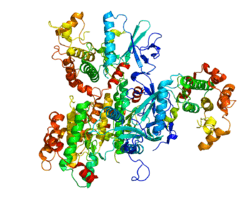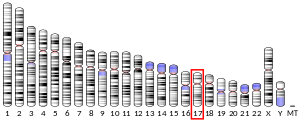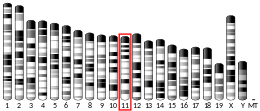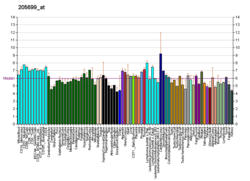MAP2K6
Dual specificity mitogen-activated protein kinase kinase 6 also known as MAP kinase kinase 6 (MAPKK 6) or MAPK/ERK kinase 6 is an enzyme that in humans is encoded by the MAP2K6 gene, on chromosome 17.[5]
Function
MAPKK 6 is a member of the dual specificity protein kinase family, which functions as a mitogen-activated protein (MAP) kinase kinase. MAP kinases, also known as extracellular signal-regulated kinases (ERKs), act as an integration point for multiple biochemical signals. This protein phosphorylates and activates p38 MAP kinase in response to inflammatory cytokines or environmental stress. As an essential component of p38 MAP kinase mediated signal transduction pathway, this gene is involved in many cellular processes such as stress-induced cell cycle arrest, transcription activation and apoptosis.[6]
Interactions
MAP2K6 has been shown to interact with TAOK2,[7] ASK1,[8][9] MAPK14[7][10][11][12] and MAP3K7.[13][14][15][16]
References
- GRCh38: Ensembl release 89: ENSG00000108984 - Ensembl, May 2017
- GRCm38: Ensembl release 89: ENSMUSG00000020623 - Ensembl, May 2017
- "Human PubMed Reference:". National Center for Biotechnology Information, U.S. National Library of Medicine.
- "Mouse PubMed Reference:". National Center for Biotechnology Information, U.S. National Library of Medicine.
- Han J, Lee JD, Jiang Y, Li Z, Feng L, Ulevitch RJ (Feb 1996). "Characterization of the structure and function of a novel MAP kinase kinase (MKK6)". The Journal of Biological Chemistry. 271 (6): 2886–91. doi:10.1074/jbc.271.6.2886. PMID 8621675.
- "Entrez Gene: MAP2K6 mitogen-activated protein kinase kinase 6".
- Chen Z, Cobb MH (May 2001). "Regulation of stress-responsive mitogen-activated protein (MAP) kinase pathways by TAO2". The Journal of Biological Chemistry. 276 (19): 16070–5. doi:10.1074/jbc.M100681200. PMID 11279118.
- Huang S, Shu L, Dilling MB, Easton J, Harwood FC, Ichijo H, Houghton PJ (Jun 2003). "Sustained activation of the JNK cascade and rapamycin-induced apoptosis are suppressed by p53/p21(Cip1)". Molecular Cell. 11 (6): 1491–501. doi:10.1016/S1097-2765(03)00180-1. PMID 12820963.
- Morita K, Saitoh M, Tobiume K, Matsuura H, Enomoto S, Nishitoh H, Ichijo H (Nov 2001). "Negative feedback regulation of ASK1 by protein phosphatase 5 (PP5) in response to oxidative stress". The EMBO Journal. 20 (21): 6028–36. doi:10.1093/emboj/20.21.6028. PMC 125685. PMID 11689443.
- Sanz-Moreno V, Casar B, Crespo P (May 2003). "p38alpha isoform Mxi2 binds to extracellular signal-regulated kinase 1 and 2 mitogen-activated protein kinase and regulates its nuclear activity by sustaining its phosphorylation levels". Molecular and Cellular Biology. 23 (9): 3079–90. doi:10.1128/MCB.23.9.3079-3090.2003. PMC 153192. PMID 12697810.
- Raingeaud J, Whitmarsh AJ, Barrett T, Dérijard B, Davis RJ (Mar 1996). "MKK3- and MKK6-regulated gene expression is mediated by the p38 mitogen-activated protein kinase signal transduction pathway". Molecular and Cellular Biology. 16 (3): 1247–55. doi:10.1128/mcb.16.3.1247. PMC 231107. PMID 8622669.
- Stein B, Brady H, Yang MX, Young DB, Barbosa MS (May 1996). "Cloning and characterization of MEK6, a novel member of the mitogen-activated protein kinase kinase cascade". The Journal of Biological Chemistry. 271 (19): 11427–33. doi:10.1074/jbc.271.19.11427. PMID 8626699.
- Ishitani T, Takaesu G, Ninomiya-Tsuji J, Shibuya H, Gaynor RB, Matsumoto K (Dec 2003). "Role of the TAB2-related protein TAB3 in IL-1 and TNF signaling". The EMBO Journal. 22 (23): 6277–88. doi:10.1093/emboj/cdg605. PMC 291846. PMID 14633987.
- Wang C, Deng L, Hong M, Akkaraju GR, Inoue J, Chen ZJ (Jul 2001). "TAK1 is a ubiquitin-dependent kinase of MKK and IKK". Nature. 412 (6844): 346–51. doi:10.1038/35085597. PMID 11460167.
- Ninomiya-Tsuji J, Kishimoto K, Hiyama A, Inoue J, Cao Z, Matsumoto K (Mar 1999). "The kinase TAK1 can activate the NIK-I kappaB as well as the MAP kinase cascade in the IL-1 signalling pathway". Nature. 398 (6724): 252–6. doi:10.1038/18465. PMID 10094049.
- Sakurai H, Miyoshi H, Mizukami J, Sugita T (Jun 2000). "Phosphorylation-dependent activation of TAK1 mitogen-activated protein kinase kinase kinase by TAB1". FEBS Letters. 474 (2–3): 141–5. doi:10.1016/S0014-5793(00)01588-X. PMID 10838074.
Further reading
- Ben-Levy R, Hooper S, Wilson R, Paterson HF, Marshall CJ (Sep 1998). "Nuclear export of the stress-activated protein kinase p38 mediated by its substrate MAPKAP kinase-2". Current Biology. 8 (19): 1049–57. doi:10.1016/S0960-9822(98)70442-7. PMID 9768359.
- Tanaka S, Nakamura K, Takahasi N, Suda T (Dec 2005). "Role of RANKL in physiological and pathological bone resorption and therapeutics targeting the RANKL-RANK signaling system". Immunological Reviews. 208: 30–49. doi:10.1111/j.0105-2896.2005.00327.x. PMID 16313339.
- Doza YN, Cuenda A, Thomas GM, Cohen P, Nebreda AR (May 1995). "Activation of the MAP kinase homologue RK requires the phosphorylation of Thr-180 and Tyr-182 and both residues are phosphorylated in chemically stressed KB cells". FEBS Letters. 364 (2): 223–8. doi:10.1016/0014-5793(95)00346-B. PMID 7750576.
- Maruyama K, Sugano S (Jan 1994). "Oligo-capping: a simple method to replace the cap structure of eukaryotic mRNAs with oligoribonucleotides". Gene. 138 (1–2): 171–4. doi:10.1016/0378-1119(94)90802-8. PMID 8125298.
- Raingeaud J, Whitmarsh AJ, Barrett T, Dérijard B, Davis RJ (Mar 1996). "MKK3- and MKK6-regulated gene expression is mediated by the p38 mitogen-activated protein kinase signal transduction pathway". Molecular and Cellular Biology. 16 (3): 1247–55. doi:10.1128/mcb.16.3.1247. PMC 231107. PMID 8622669.
- Stein B, Brady H, Yang MX, Young DB, Barbosa MS (May 1996). "Cloning and characterization of MEK6, a novel member of the mitogen-activated protein kinase kinase cascade". The Journal of Biological Chemistry. 271 (19): 11427–33. doi:10.1074/jbc.271.19.11427. PMID 8626699.
- Moriguchi T, Kuroyanagi N, Yamaguchi K, Gotoh Y, Irie K, Kano T, Shirakabe K, Muro Y, Shibuya H, Matsumoto K, Nishida E, Hagiwara M (Jun 1996). "A novel kinase cascade mediated by mitogen-activated protein kinase kinase 6 and MKK3". The Journal of Biological Chemistry. 271 (23): 13675–9. doi:10.1074/jbc.271.23.13675. PMID 8663074.
- Cuenda A, Alonso G, Morrice N, Jones M, Meier R, Cohen P, Nebreda AR (Aug 1996). "Purification and cDNA cloning of SAPKK3, the major activator of RK/p38 in stress- and cytokine-stimulated monocytes and epithelial cells". The EMBO Journal. 15 (16): 4156–64. doi:10.1002/j.1460-2075.1996.tb00790.x. PMC 452138. PMID 8861944.
- Goedert M, Cuenda A, Craxton M, Jakes R, Cohen P (Jun 1997). "Activation of the novel stress-activated protein kinase SAPK4 by cytokines and cellular stresses is mediated by SKK3 (MKK6); comparison of its substrate specificity with that of other SAP kinases". The EMBO Journal. 16 (12): 3563–71. doi:10.1093/emboj/16.12.3563. PMC 1169981. PMID 9218798.
- Suzuki Y, Yoshitomo-Nakagawa K, Maruyama K, Suyama A, Sugano S (Oct 1997). "Construction and characterization of a full length-enriched and a 5'-end-enriched cDNA library". Gene. 200 (1–2): 149–56. doi:10.1016/S0378-1119(97)00411-3. PMID 9373149.
- Enslen H, Raingeaud J, Davis RJ (Jan 1998). "Selective activation of p38 mitogen-activated protein (MAP) kinase isoforms by the MAP kinase kinases MKK3 and MKK6". The Journal of Biological Chemistry. 273 (3): 1741–8. doi:10.1074/jbc.273.3.1741. PMID 9430721.
- Chan-Hui PY, Weaver R (Dec 1998). "Human mitogen-activated protein kinase kinase kinase mediates the stress-induced activation of mitogen-activated protein kinase cascades". The Biochemical Journal. 336 (Pt 3): 599–609. doi:10.1042/bj3360599. PMC 1219910. PMID 9841871.
- Chen Z, Hutchison M, Cobb MH (Oct 1999). "Isolation of the protein kinase TAO2 and identification of its mitogen-activated protein kinase/extracellular signal-regulated kinase kinase binding domain". The Journal of Biological Chemistry. 274 (40): 28803–7. doi:10.1074/jbc.274.40.28803. PMID 10497253.
- Cong F, Goff SP (Nov 1999). "c-Abl-induced apoptosis, but not cell cycle arrest, requires mitogen-activated protein kinase kinase 6 activation". Proceedings of the National Academy of Sciences of the United States of America. 96 (24): 13819–24. doi:10.1073/pnas.96.24.13819. PMC 24148. PMID 10570156.
- Wang X, McGowan CH, Zhao M, He L, Downey JS, Fearns C, Wang Y, Huang S, Han J (Jul 2000). "Involvement of the MKK6-p38gamma cascade in gamma-radiation-induced cell cycle arrest". Molecular and Cellular Biology. 20 (13): 4543–52. doi:10.1128/MCB.20.13.4543-4552.2000. PMC 85840. PMID 10848581.
- Visconti R, Gadina M, Chiariello M, Chen EH, Stancato LF, Gutkind JS, O'Shea JJ (Sep 2000). "Importance of the MKK6/p38 pathway for interleukin-12-induced STAT4 serine phosphorylation and transcriptional activity". Blood. 96 (5): 1844–52. PMID 10961885.
- Fleming Y, Armstrong CG, Morrice N, Paterson A, Goedert M, Cohen P (Nov 2000). "Synergistic activation of stress-activated protein kinase 1/c-Jun N-terminal kinase (SAPK1/JNK) isoforms by mitogen-activated protein kinase kinase 4 (MKK4) and MKK7". The Biochemical Journal. 352 Pt 1 (Pt 1): 145–54. doi:10.1042/0264-6021:3520145. PMC 1221441. PMID 11062067.
- Vitale G, Bernardi L, Napolitani G, Mock M, Montecucco C (Dec 2000). "Susceptibility of mitogen-activated protein kinase kinase family members to proteolysis by anthrax lethal factor". The Biochemical Journal. 352 Pt 3 (Pt 3): 739–45. doi:10.1042/0264-6021:3520739. PMC 1221512. PMID 11104681.






